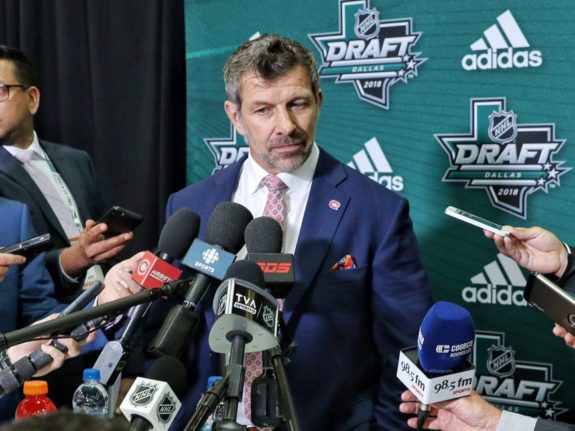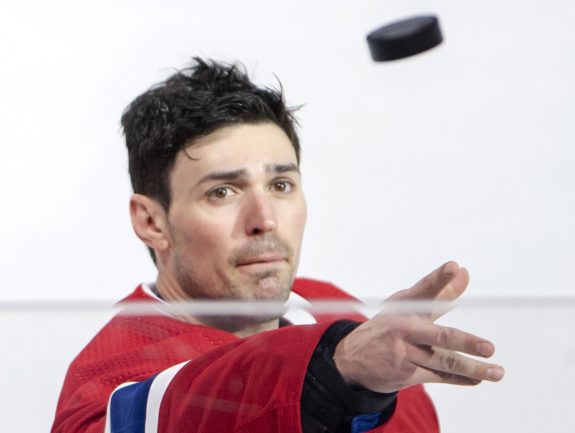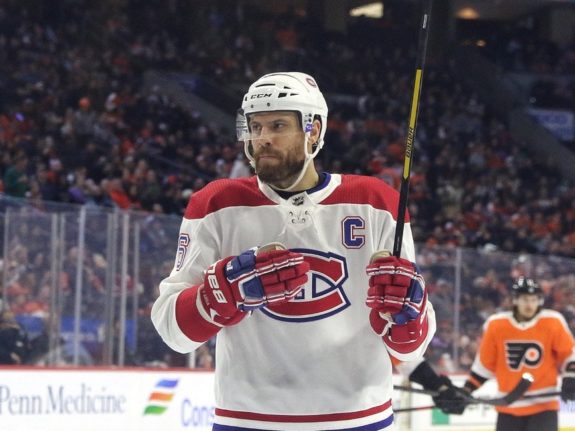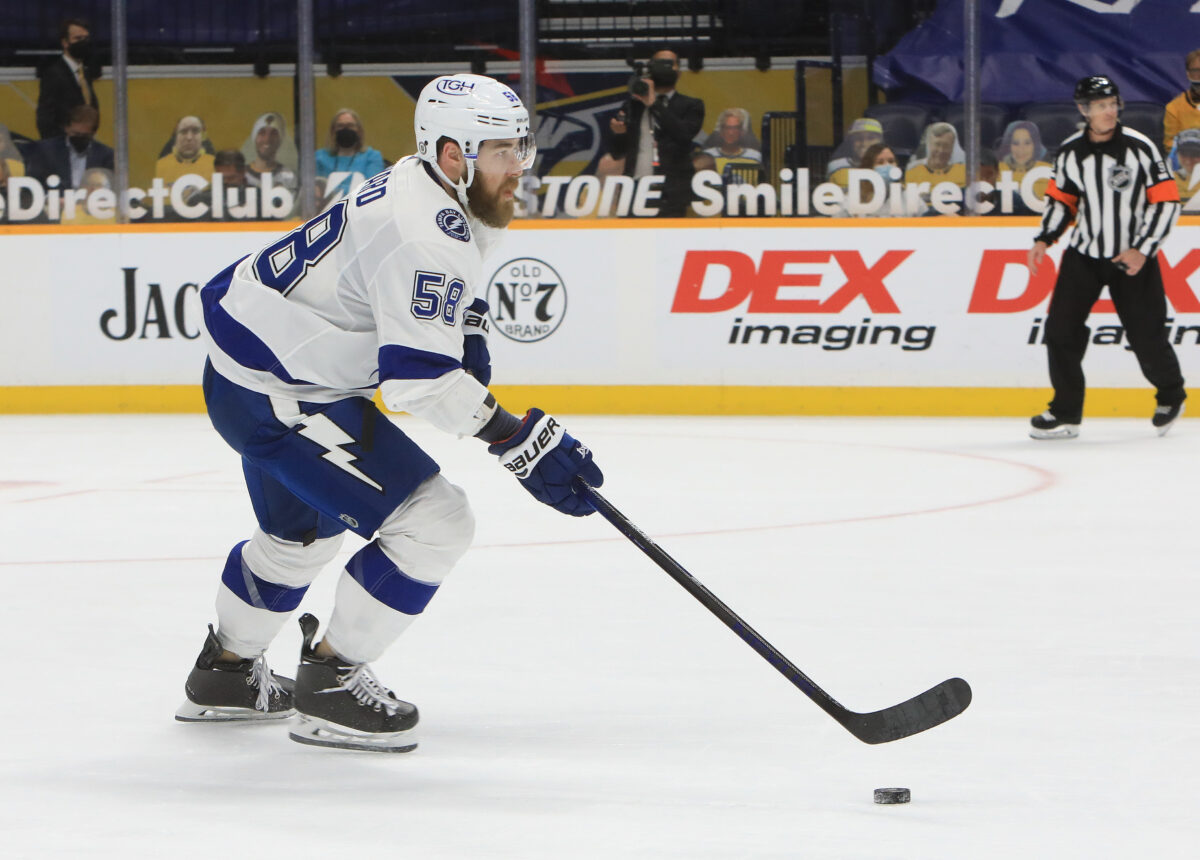It feels like just yesterday the Montreal Canadiens were down 3-1 to the Toronto Maple Leafs last playoffs and people were calling for general manager Marc Bergevin’s job. That’s probably because it was yesterday, at least that last part.
Indeed, even though the Canadiens are mere months removed from a trip to the Stanley Cup Final, people are unwilling to look past the current, admittedly sad state of affairs. To be fair, it is one of the worst starts in franchise history, which stands at 5-15-2 heading into action Saturday night. However, you’d think fans would still be a little more forgiving… or not. We are talking the Habs and their fans after all.

However, in the face of all the criticism leveled his way, how much is Bergevin to blame, really? From his perspective, it must weigh heavy on him to the point that, despite reports of a contract extension on the table, it’s hardly a given he would even want to return once his current deal expires this coming offseason.
Such an extension would fly in the face of general public sentiment. However, there are two sides to every story. We’re talking about a multi-time nominee for the Jim Gregory General Manager of the Year Award, after all. In any case, this is Bergevin’s… how another go-around might not be a horrible idea. Spoiler: It is.
Flat $81.5 Million Salary Cap
True, there are 31 other GMs out there who have to contend with the cap. However, had Bergevin known about the pandemic and resulting flat $81.5 million salary cap in advance, he may not have been so quick to re-sign goalie Carey Price to his current contract, which obviously carries a hard-to-navigate $10.5 million hit.
Of course, Price is the biggest reason the Canadiens reached the Final. Take him out of the picture and Bergevin’s biggest argument as to why he should stay in town, last year’s playoff success, disappears with him.

It plays more to the issue of the contract itself than the player and how the team’s construction, which is built primarily on its strength in net, is flawed, when Price has long since peaked, at least based on his regular-season success. Obviously, Price can still be a difference-maker, but to invest so heavily in an at-the-time 30-year-old goalie was asking for trouble on the part of Bergevin. So, the flat cap cannot be an excuse.
Price, Weber Injured
In fact, take Price, a player Bergevin inherited for the record, out of the picture, and the problems with this team become glaringly obvious. Without Price, who started the season in the NHL’s player assistance program and has yet to return, the defense has come across as badly exposed overall.
True, part of that stems from the early unanticipated retirement of Shea Weber, who left a hole on the right side that cannot be filled. However, Weber was also entering the twilight of his career anyway, with holes in own game showing more and more. He undeniably took his game to another level these past playoffs, but one has to wonder how much of that was a matter of him leaving it all on the ice, because he hypothetically had an idea the end was nigh anyway.
That’s admitted speculation, but it’s of no consequence. Weber is gone, likely not coming back, and it’s up to Bergevin to build up his defense again. However, based on Weber’s play of late in general, the Canadiens arguably dodged a bullet, getting the chance to put Weber’s $7,857,143 hit on long-term injured reserve (LTIR). In the long term, Bergevin or his successor comes out ahead.

Bergevin’s only saving grace is such an instance is that it’s unrealistic for him to have been able to replace Weber on such short notice. After all, Weber in his prime is irreplaceable. We’re not talking about Weber in his prime, though. We’re talking about a 36-year-old defenseman, for whom something of a succession plan should have been put in place. Furthermore, by placing Weber on LTIR, Bergevin was given the cap space to make some moves. In response, he put together potentially his worst offseason ever as Canadiens GM.
Of course, the Canadiens’ situation can’t be oversimplified to include just the injuries to Price and Weber, although they are the primary focal points of the Habs’ troubles this season. Even so, injuries are never an excuse, especially when teams that are more injured than you are doing better in the standings.
To his credit, Bergevin has readily admitted injuries do not justify the poor start. However, he has claimed the players are better than they’ve performed up to now, pointing to the Final appearance as proof (but conveniently neglecting to mention his sub-par work since). It’s really the only argument he can make, because if he says anything different it’s his roster and his fault. However, it’s still his roster, regardless. And the team he put together (minus Price and Brendan Gallagher) just isn’t showing enough resolve right now.
Cultural Need for French Players on Canadiens
One other thing Bergevin can argue in his defense is it’s hard to put together the best possible team in the province of Quebec due to a variety of factors, including taxes, but also language politics. He of course would never make this argument himself, because those politics prevent him from doing so.
For starters, the head coach of the Canadiens has to speak French (according to owner Geoff Molson). And, following all the hoopla from last season when the Habs failed to dress a single French-Canadian player for the first time in history, there has to be a lot of local talent on the roster.
Let’s call a spade, a spade. That was a non-story. The Canadiens had French-Canadian players on the team, but Phillip Danault and Jonathan Drouin were injured. For head coach Dominique Ducharme, playing Paul Byron over a career-minor-leaguer in Alex Belzile, the only other native Quebecer available, down the stretch during the regular season should have been a no-brainer. Yet you have politicians like Premier Francois Legault crying foul as a result?
It should be no wonder Bergevin reloaded on French-speaking talent, especially following the departure of Danault to the Los Angeles Kings. But, as a result, then you have players like Mathieu Perreault, Cedric Paquette and David Savard being cast in roles they wouldn’t play on a playoff team anywhere else.
Related: Canadiens’ Best Bet in Net Is Now Montembeault
With regard to Savard specifically, his contract is fair, but it’s like the reverse situation with Price. Consider he played 14:07 per game with the Tampa Bay Lightning last playoffs, the lowest amount of the team’s six regular defensemen. On the Canadiens? He’s a third-ranked 19:21 per game.

So, is it really any surprise the Canadiens lost 4-1 in the Final and that they’re not so much in contention for a playoff spot right now? When the team, especially its defense, is constructed the way it is, it’s clear its problems supersede language, though. With Savard or without him last season (Weber), you’ve got three stay-at-home defensemen in your top four.
True, the one true puck-mover you’ve got in Jeff Petry is in the midst of his worst season ever, and that’s not something you could have realistically predicted, but that’s seemingly true for about half the roster right now. There comes a point when it’s not them. It’s Bergevin.
Ultimately, Savard was not the man for the job. Neither should Bergevin be moving forward. Under ideal circumstances, you let him walk away on his own because of his 10 years with the team, but, if he’s destined to leave, you (Molson) shouldn’t want him in charge ahead of what can be a course-altering trade deadline for the franchise.
True, Bergevin’s successor will inevitably run into the same language issues. They’re unavoidable like pylons on Montreal city streets. However, if Bergevin hasn’t won yet, he never will… especially following last playoffs. Someone else is bound to have more success. No one can take away the Final appearance from him, but, considering it took 10 years for him to get to that point and how far his Habs have fallen in the few months since, it may take another 10 years to get back. The official tear-down is a formality. It’s unofficially begun with Weber retiring. Building it back up should be someone else’s responsibility.